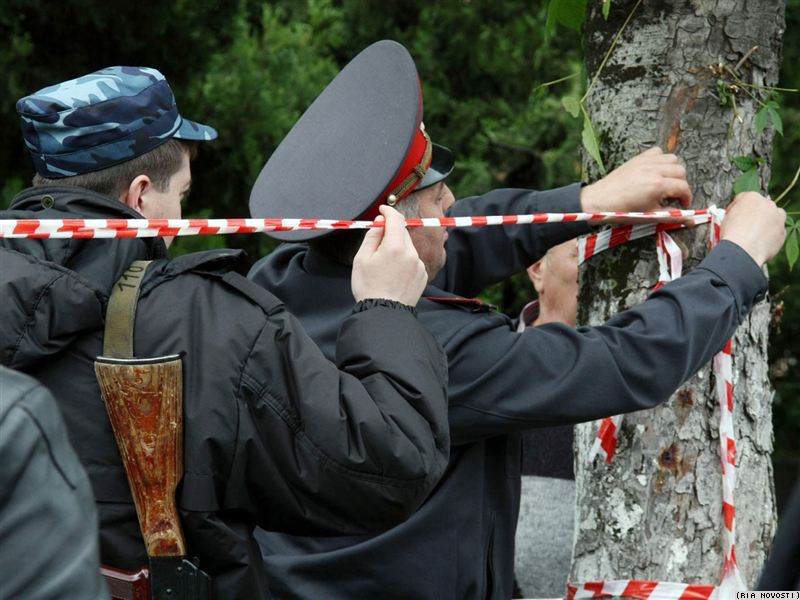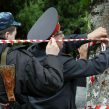
New Year Brings Little Peace to the North Caucasus
Publication: Eurasia Daily Monitor Volume: 8 Issue: 5

An analysis by Kavkavsky Uzel found that the security situation deteriorated significantly last year in Kabardino-Balkaria, where rebels became markedly more active. According to the website, there was a sharp jump in the number of gun attacks, bombings and terrorist acts in the republic during the summer: during the 50 days from June 1 to July 20, there were at least 17 bomb blasts and eight ambushes of law-enforcement personnel, while 13 explosive devices were defused.
For the year as a whole, there were at least 41 attacks on police and security personnel in Kabardino-Balkaria, in which 23 law-enforcement officers were killed and 35 wounded. According to the republic’s law-enforcement bodies, at least 24 members of “illegal armed formations” were killed and seven captured in 2010, while 26 explosive devices were found and defused during the year.
The authorities in Kabardino-Balkaria twice declared counter-terrorist regimes in the republic during the year: a counter-terrorist regime was imposed in the town of Tyrnyauz for nearly two months – from October 20 to December 25 – after a shootout between rebels and police in which one policeman and three rebels were killed. Following the shootout, police and security forces blockaded a group of suspected rebels in a mine at a disused tungsten-molybdenum factory in Tyrnyauz. Some 400 security personnel were involved in the operation in the mine, during which two alleged wanted rebels, identified as Artur Sottaev and Ruslan Uyanaev, were killed. On November 18, Kabardino-Balkaria’s Prime Minister, Aleksandr Merkulov, announced that all entrances to the mine would be sealed to prevent it from being used by rebels and “criminal elements.”
Another counter-terrorist regime was imposed in the republic on August 27, this time in its capital Nalchik, where five suspected rebels were killed during a special operation that day. According to Kavazsky Uzel, the public was not informed in advance about the special operation, which created a panic among local residents.
Commenting on the situation in Kabardino-Balkaria, Aleksandr Cherkasov of the Memorial human rights group suggested that the republic provides an example of the way that harsh and indiscriminate measures taken by the authorities in the North Caucasus in the name of eradicating terrorism are actually strengthening the insurgency in the region. Cherkasov noted that these measures often target not the terrorists themselves, but those who practice a form of Islam that differs from that practiced locally. Cherkasov also said that the use of torture and the fabrication of evidence against alleged terrorists have become the norm, and that these methods “rob the state of its … moral advantage over the terrorist underground” (www.kavkaz-uzel.ru, January 7).
Meanwhile, violence has continued in the North Caucasus since the start of 2011. On January 5, authorities in Dagestan imposed a counter-terrorist regime in Khasavyurt and carried out a special operation in which four suspected rebels were killed, including the alleged “emir” of Khasavyurt, Ruslan Makavov. Three policemen were slightly wounded in the operation. On January 4, two suspected rebels, identified as Badrudi Rasulov and Maksud Ismailov, were killed in a special operation in the village of Shamkhal on the outskirts of Dagestan’s capital Makhachkala. That same day, police were attacked by the occupants of a car they had stopped for a document check in Makhachkala. One policeman was shot and died of his wounds on the way to the hospital, while one of the attackers was also killed. Two other suspected attackers were later arrested (www.kavkaz-uzel.ru, January 7).
A grocery store was blown up in Khasavyurt on January 2. A police source told Interfax that an explosive device went off at the store’s entrance and that the store was almost completely destroyed (Interfax, January 2).
In the early hours of January 1, the acting head of the criminal investigation department in Dagestan’s Untsukulsky district, Magomedrasul Makachev, was shot by unidentified attackers. He later died of his wounds (www.newsru.com, January 1).
On January 4, the deputy chief of staff of the Russian military unit stationed in Nazran, Ingushetia, Aleksandr Orlov, was severely wounded in Vladikavkaz, in neighboring North Ossetia, after a bomb placed under his car detonated. Orlov reportedly regained consciousness at Vladikavkaz’s Central Clinical Hospital the following day (www.kavkaz-uzel.ru, January 5).
In Ingushetia, a bomb exploded on a railway line on the outskirts of the city of Nazran on January 4 as a freight train was passing by. The blast derailed six of the train’s cars and left a crater more than one meter in diameter (www.newsru.com, January 4).
On January 3, unidentified attackers blew up a gas station near the village of Gazi-Yurt in Ingushetia’s Nazran district. Ingushetia’s interior ministry reported that no one was killed or injured in the explosion which, according to the ministry, may have been the result of a grenade launcher fired at the gas station. That same day, unidentified assailants hurled hand grenades at two policemen who were guarding a Christmas tree in the central square of the village of Ordzhonikidzevskaya in Ingushetia’s Sunzha district. No one was hurt in the incident (Interfax, January 3).
On January 2, unidentified gunmen fired from under-barrel grenade launchers at a Russian Orthodox Church in Ordzhonikidzevskaya. No one was hurt in the attack, which caused minor damage to the church. It was the third such attack on a Russian Orthodox Church in the village (www.kavkaz-uzel.ru, January 3).
In Chechnya, three policemen were attacked and wounded with knives by a local resident in Urus-Martan on January 1. Police shot the attacker, who died on the way to the hospital. On New Year’s Eve, December 31, two Russian interior ministry troops were shot and wounded in Grozny (RIA Novosti, January 1).




